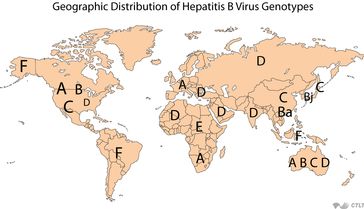By
Liz Highleyman
Several
studies have found that treatment with interferon
alpha increases the likelihood of HBeAg clearance and
anti-HBe antibody seroconversion in chronic hepatitis
B patients. It is well known that hepatitis
C response to interferon-based
therapy is heavily influenced by viral genotype, but this
relationship has not been well established for hepatitis B.
In the present study, Hakan Senturk from Istanbul University
and colleagues evaluated long-term outcomes of interferon
alpha treatment in initially HBeAg positive chronic hepatitis
B patients in Egypt, where HBV
genotype D accounts for almost all cases.

The
researchers identified 71 participants who were treated with
10 MU interferon
alpha 2b (Intron A) 3 times weekly for 24 weeks, were
subsequently followed off treatment for at least 10 years
(at 3-6 month intervals), and showed sustained response, defined
as undetectable HBV DNA and HBeAg seroconversion. About 85%
of selected participants were men and the average age was
29 years.
Results
 |
28
patients (39%) achieved HBeAg seroconversion (25 during
therapy, 3 within the first 12 months of post-treatment
follow-up). |
 |
Over
an average follow-up period of 152 months (just over 2.5
years), 21 out of 25 initial responders (84%) relapsed.
|
 |
However,
3 patients who had not responded by the end of therapy
achieved sustained response during later follow-up. |
 |
Thus,
21 out of 28 responders (75.0%) relapsed in total, either
with HBeAg seroreversion (3 patients; 14.3%) or HBV DNA
> 2000 IU/mL and elevated ALT (18 patients; 85.7%). |
 |
Just
7 patients (9.8%) demonstrated sustained response. |
 |
3
patients (4.2%) experienced serious side effects leading
to treatment discontinuation. |
 |
In
a multivariate analysis, no pre-treatment parameters appeared
to be significant in predicting response. |
Based
on these findings, the study authors concluded, "Sustained
response to interferon treatment is low in HBeAg positive
chronic hepatitis B patients with genotype D."
Cerrahpasa Medical Faculty, Department of Gastroenterology,
Istanbul University, Cerrahpasa, Istanbul, Turkey; Department
of Human Researches, University of Pittsburgh Medical Center,
Pittsburgh, PA; Cerrahpasa Medical Faculty, Department of
Infectious Diseases, Istanbul University, Istanbul, Turkey;
Department of Internal Medicine, Istanbul Education and Training
Hospital, Istanbul, Turkey; Cerrahpasa Medical Faculty, Department
of Pathology, Istanbul University, Istanbul, Turkey.
7/30/10
Reference
Long-Term Effect of Interferon Therapy in Patients with HBeAg
Positive Chronic Hepatitis B Infection. Digestive Diseases
and Sciences (Abstract).
May 14, 2010 (Epub ahead of print).
